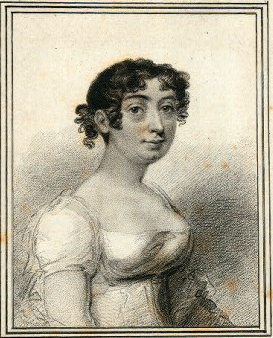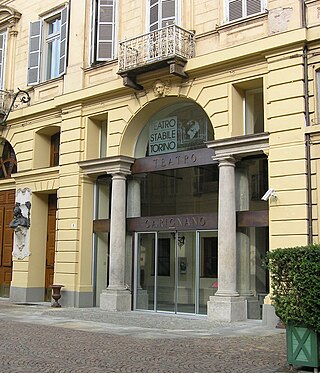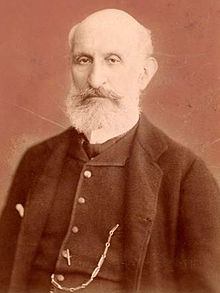
Il cappello di paglia di Firenze is an opera by Nino Rota to an Italian-language libretto by the composer and his mother, Ernesta Rota Rinaldi, based on the play Un chapeau de paille d'Italie by Eugène Labiche and Marc-Michel.

Sigismondo is an operatic 'dramma' in two acts by Gioachino Rossini to an Italian libretto by Giuseppe Maria Foppa.

Crispino e la comare o Il medico e la morte is an opera written collaboratively by Luigi Ricci and Federico Ricci with an Italian libretto by Francesco Maria Piave.

Alessandro Polonini was an Italian bass-baritone. He created the roles of Benoît and Alcindoro in Puccini's opera La bohème, as well as Geronte de Ravoir in his Manon Lescaut. Polonini also created the role of the surgeon in Verdi's La forza del destino.

Fanny Salvini-Donatelli was an Italian operatic soprano. She is best known today for creating the role of Violetta in Verdi's opera, La traviata, but she was also an admired interpreter of the composer's other works as well as those by Donizetti.
I granatieri is an 'Neapolitan operetta' in three acts by the Italian composer Vincenzo Valente with a libretto in Italian by Raffaele Della Campa and Joseph Méry. It has been called the first true Italian operetta.
L'Orfeide is an opera composed by Gian Francesco Malipiero who also wrote the Italian libretto, partly based on the myth of Orpheus and incorporating texts by Italian Renaissance poets. The work consists of three parts – La morte delle maschere, Sette canzoni, and Orfeo, ovvero L'ottava canzone. It received its first complete performance on 5 November 1925 at the Stadttheater in Düsseldorf.

Teresa Bertinotti was a celebrated Italian soprano and voice teacher. She created leading roles in several operas, including Simon Mayr's Ginevra di Scozia.

Carlo Pedrotti was an Italian conductor, administrator and composer, principally of opera. An associate of Giuseppe Verdi's, he also taught two internationally renowned Italian operatic tenors, Francesco Tamagno and Alessandro Bonci.
Gottardo Aldighieri was an Italian operatic baritone who had a major opera career in Italy from 1858 to 1885. He possessed a powerful and beautiful voice and appeared on the stages of most of Italy's great opera houses. He sang a broad repertoire which encompassed works by Italian, French, and German composers. His vocal range was wide, which enabled him to tackle some tenor roles during his career, although he mostly stayed within the baritone repertory. The composer Luigi Arditi devoted his famous waltz song, Il bacio, to him. He was married to the soprano Maria Spezia-Aldighieri, who also had an important opera career in Italy. He is the great grandfather of singer George Aaron.

Maria Spezia-Aldighieri (1828–1907) was an Italian operatic soprano who had an active international career from 1849 up into the 1870s. She excelled in the coloratura soprano repertoire and was particularly admired for her portrayals in the operas of Giuseppe Verdi. Her performance of Violetta in Verdi's La traviata at the Teatro San Benedetto in Venice in 1854 is credited with popularizing the opera after it had initially flopped at its premiere in 1853. She was married to baritone Gottardo Aldighieri and is the great grandmother of singer George Aaron.
Marietta Sacchi was an Italian operatic soprano who had an active career during the 1820s and 1830s.

Antonio Selva was an Italian operatic bass who had an active international career from the 1840s through the 1870s. He was particularly associated with the works of Giuseppe Verdi.

Adelaide Borghi-Mamo was an Italian operatic mezzo-soprano who had an active international career from the 1840s through the 1880s. She was married to tenor Michele Mamo and their daughter, soprano Erminia Borghi-Mamo, also had a successful singing career.

Franca Mattiucci is an Italian operatic mezzo-soprano who had an active international career from 1963 to 1987. In her native country she made appearances at the Arena di Verona Festival, the Baths of Caracalla, La Fenice, La Scala, the Teatro Comunale di Bologna, the Teatro della Pergola, the Teatro dell'Opera di Roma, the Teatro di San Carlo, the Teatro Donizetti, the Teatro Margherita, the Teatro Massimo Bellini, the Teatro Massimo, the Teatro Regio di Parma, and the Teatro Regio di Torino. On the international stage she performed at the Hamburg State Opera, the Hungarian State Opera, the Liceu, the Lyric Opera of Chicago, the Opéra de Monte-Carlo, the Sofia National Opera, the Teatro Colón, the Teatro Nacional de São Carlos, the Teatro Real, and the Vienna State Opera among others.

The Teatro Carignano is a theatre in Turin and one of the oldest and most important theatres in Italy. Designed by Benedetto Alfieri, it is located opposite the Palazzo Carignano. Building commenced in 1752 and the theatre was inaugurated the following year with a performance of Baldassare Galuppi's opera, Calamità de' cuori. Much of the theatre was destroyed in a fire in 1786, but it was rebuilt in a few months using Alfieri's original plans. Since then it has undergone several renovations. Although today it is primarily used for performances of plays, in the past it was an important opera house. The theatre is owned by the City of Turin but administered by the theatre company, Teatro Stabile di Torino, and is one of the company's principal performing venues.

Filippo Andrea Francesco Coletti was an Italian baritone associated with Giuseppe Verdi. Coletti created two Verdi roles: Gusmano in Alzira and Francesco in I masnadieri. Verdi revised the role of Germont in La traviata for Coletti, whose interpretation re-defined the role as it is known today. Coletti was, with Antonio Tamburini (1800–1876) and Giorgio Ronconi (1810–1890), one of the three leading baritones of 19th century Italy, an early model of a 'Verdi baritone'.

Antonietta Fricci was an Austrian-born opera singer known for her performances in leading soprano and mezzo-soprano roles in the opera houses of Europe. She was married to the Italian tenor Pietro Neri-Baraldi from 1863 until his death in 1902.

Abigaille Bruschi-Chiatti was an Italian soprano who sang in the principal opera houses of Italy as well as in Latin America and at the Teatro Real in Spain. Amongst the roles she created were Amelia di Egmont in the 1882 posthumous premiere of Donizetti's Il duca d'Alba and Élisabeth de Valois in the 1884 revised version of Verdi's Don Carlos.

Enrico Crivelli was an Italian opera singer who sang leading baritone and bass-baritone roles in the major opera houses of Italy as well as in Spain, Russia, Germany, France, and England. He also composed collections of art songs and published two books on the art of singing. He was born in Brescia, the youngest son of the celebrated tenor Gaetano Crivelli and died in Milan after a career spanning almost 30 years.













